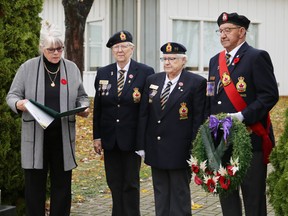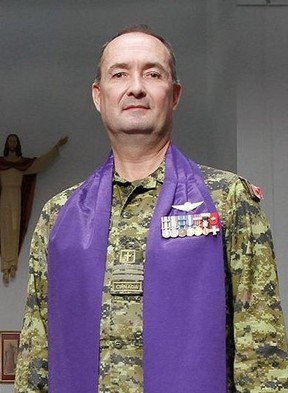Directives to military chaplains urge expunging God, religion from Remembrance Day, public ceremonies
[Plain and simple,, they hate us. Our Globalist Ottawa elite cannot replace the traditions of the European founding/settler, mostly Christian people fast enough. The Canadian military may have fewer than a dozen serviceable tanks, jet fighters are a generation out of date, the second hand submarines spend more time being repaired than at sea, and moral and recruitment are in the dumps, but, by God(if that’s not too politically incorrect, the Canadian Armed Forces are “diverse and inclusive,” and won’t tolerate any of that God stuff from pastors!
New directives for military chaplains that tell them to be “respectful of … spiritual diversity” during public addresses, to employ “Gender Based Analysis” and replace religious symbols like crosses and stars of David with a generic chaplain’s crest could spell the death of the role in Canada’s Armed Forces, says one long-serving veteran of the chaplaincy.
“It’s a further trek down the road of trying to eliminate religion altogether in the military,” said Father Timothy Nelligan, who served over 35 years as a Canadian Armed Forces member, two decades of those as a Roman Catholic chaplain.Article content
The director of chaplaincy services for the Royal Canadian Chaplaincy Service has also said it would mean that any mentions of God and religious language should be left out of any public ceremonies at Remembrance Day.
The directive urges chaplains to ‘adopt a sensitive and inclusive approach’ during public addressess. … Fr.
Nelligan said he thinks it is all leading towards eventually eliminating the role of the chaplain in the Canadian military.
“If that continues, all we’ll be doing is glorifying the secular,” he said. “In an effort to be inclusive, all the government is doing is being markedly exclusive.” — Paul Fromm, Director.]

New directives for military chaplains that tell them to be “respectful of … spiritual diversity” during public addresses, to employ “Gender Based Analysis” and replace religious symbols like crosses and stars of David with a generic chaplain’s crest could spell the death of the role in Canada’s Armed Forces, says one long-serving veteran of the chaplaincy.Article content
“It’s a further trek down the road of trying to eliminate religion altogether in the military,” said Father Timothy Nelligan, who served over 35 years as a Canadian Armed Forces member, two decades of those as a Roman Catholic chaplain.Article content
The director of chaplaincy services for the Royal Canadian Chaplaincy Service has also said it would mean that any mentions of God and religious language should be left out of any public ceremonies at Remembrance Day.
“Because it came from the Chaplain General’s office, the thing that hurt me the most was to hear someone, supposedly a person of faith, supporting the removal,” said Nelligan, who served providing spiritual support for Canadian troops in Afghanistan. Now retired from the military, he is pastor at Blessed Sacrament Parish in Ottawa and a priest of the Military Ordinariate of Canada.
The directive, issued earlier this month by Canada’s Office of the Chaplain General, urges Canada’s military chaplains to “adopt a sensitive and inclusive approach” during public addresses.
The Department of National Defence said in a statement to National Post that the directives should be viewed as “expanding participation in the reflections of military chaplains,” as opposed to limiting them.Article content
“We deeply value the work of military chaplains to support CAF members — and we’ll continue to build a diverse, inclusive military that attracts and retains talented people,” the statement read. “Our commitment to diversity, inclusion and the betterment of our chaplaincy program remains steadfast as we strive to create a more inclusive and respectful environment with the Department of National Defence and Canadian Armed Forces.”Related Stories
- Canadian Forces personnel leaving the ranks over lack of affordable housing, senior officer warns
- Watchdog finds Defence Department contravened a law designed to help whistleblowers
The new directive bases much of its policy as a reaction to a 2015 Supreme Court of Canada decision concerning a Quebec city council’s habit of reciting prayers and crossing themselves before council meetings, which found that government could not “promote the participation of certain believers or non-believers in public life to the detriment of others.”
A section in the new directive entitled “Public Addresses” urges chaplains to be “inclusive” and “respectful of… religious and spiritual diversity” during public reflections.Article content
“They should employ a language mindful of the Gender Based Analysis (GBA+) principles, incorporate elements in both official languages, and include the use of local languages when appropriate,” the directive read.
The directive also does away with the traditional military chaplain stoles, replacing individual symbols of faith with a generic chaplain’s crest.
“Chaplains must consider the potential that some items or symbols may cause discomfort or traumatic feelings when choosing the dress they wear during public occasions,” the directive reads.
It also asks chaplains to cease requesting removal of hats and head coverings, as “reflections” are not considered religious ceremonies.

The new directive comes after last year’s report from the defence minister’s systemic racism and discrimination advisory panel that recommended Canada cease hiring chaplains from faiths with more traditional beliefs and recommended sweeping changes for the CAF chaplaincy program.
Religion, the report states, should be considered a “source of suffering and generational trauma” for some Canadians.Article content
“This is especially true for many lesbian, gay, bisexual, transgender, queer and two-spirited members of Canadian society,” the report read in its sixth recommendation, entitled “re-defining chaplaincy.”
Many Canadian military chaplains, the report states, “represent or are affiliated with organized religions whose beliefs are not synonymous with those of a diverse and inclusive workplace.”
Top in the report’s recommendations was avoiding hiring chaplains affiliated with “religious groups whose values are not aligned with those of the defence team.”
In response to a report last week in the Epoch Times that the new directive would ban chaplains from leading public prayers at Remembrance Day ceremonies next month, Defence Minister Bill Blair denied the accusation.
“Canadian Forces chaplains are not — and will not be — banned from prayer on Remembrance Day, nor at any other time,” he posted on X, formerly Twitter. “The Chaplain General’s directive seeks to ensure that public addresses reflect the spiritual and religious diversity of Canadians.”
The director of chaplaincy services for the Royal Canadian Chaplaincy Service has said however that in public ceremonies the directive urges that there should be no mention of God or religion. Article content
“In certain settings, in faith-based settings and church settings, they (chaplains) of course will speak about their own faith and the role that God or their heavenly being has in that setting,” Col. Lisa Pacarynuk told radio host Graham Richardson at Ottawa’s CFRA.
“But in a public setting where there are people who do not believe in God or people who bring different perspectives, they will not use that language.”
During Tuesday’s House Veterans Affairs Committee meeting, committee vice-chair Blake Richards tabled a motion calling for an investigation into what the Conservative party described as a “gag order” for chaplains.
“As a result of the directive I referenced in the motion, (chaplains) won’t be able to pray for the fallen or pray for those who’ve served this country at public ceremonies such as Remembrance Day,” Richards said.
“It may restrict our ability to hear the words to In Flanders Fields because it references crosses. It may restrict our ability to sing the national anthem, because it references God. It may restrict our ability to have hymns such as Amazing Grace, which are often sung at remembrance services.”Article content
Replies to a request for comment to the Department of National Defence consisted of a verbatim repeat of Blair’s Tweet, with an explanation that the directives should be viewed as “expanding participation in the reflections of military chaplains,” not limiting them.
“We deeply value the work of military chaplains to support CAF members – and we’ll continue to build a diverse, inclusive military that attracts and retains talented people,” the statement read.
A statement from the Royal Canadian Legion said prayer will remain an important part of Remembrance Day ceremonies, including this year’s observances at the National War Memorial.
“While military chaplains are required to modify their language, that decision does not eliminate the inclusion of prayer to God or a higher power by other spiritual representatives at Legion ceremonies,” read the statement.
Nelligan said he thinks it is all leading towards eventually eliminating the role of the chaplain in the Canadian military.
“If that continues, all we’ll be doing is glorifying the secular,” he said. “In an effort to be inclusive, all the government is doing is being markedly exclusive.”
National Post
